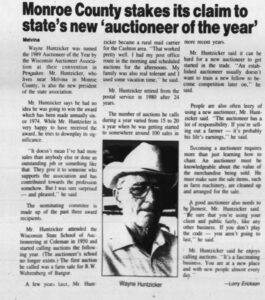MADISON — Gov. Tony Evers today, together with the Department of Safety and Professional Services (DSPS), announced new efforts to continue improving professional license processes at the state’s lead credentialing and licensing agency. The move builds upon the Evers Administration’s previous work to improve licensing efficiency at the department through limited-term and project positions, reorganizing, and contracting staff to support the department’s call center, among other critical efforts.
Among the new efforts Gov. Evers and DSPS announced today includes a new public-facing licensing dashboard designed to help improve transparency around licensing processes and department processing capacity. The licensing transparency dashboard is a continuation of Gov. Evers’ and the Evers Administration’s ongoing work to improve and modernize state services for the 21st century. Data available on the new dashboard announced today lends credence to the Evers Administration’s continued push for additional flexibility and staffing support for DSPS—the data provide an illustrative example of how additional resource and staffing support directed by Gov. Evers has helped enable DSPS to make substantial progress toward improving licensing times even with continued high demand on the agency’s limited available staff and resources.
“I’m proud of our administration’s ongoing efforts to ensure state government works for everyone, including modernizing outdated processes and systems, reducing barriers, and improving efficiency so Wisconsinites across our state can get help and access critical services when they need it most,” said Gov. Evers.
The Evers Administration’s new dashboard offers real-time information on state application timelines and capacity. The dashboard, part of Gov. Evers’ and the Evers Administration’s work to modernize state government services for the 21st century, builds upon the administration’s new online licensing platform launched last year, LicensE, to maximize efficiency in the credentialing process and reduces barriers and obstacles to applicants while prioritizing public safety and consumer protection.
The licensing dashboard highlights the average number of days it is currently taking DSPS to review new application submissions, including any additional documentation sent by applicants or third-party education institutions, employers, testing centers, and others. Dashboard data, now available for public viewing, illustrates heavy demand and significant progress that has been made at the state department responsible for occupational licensing. For example, to date, in 2023, Wisconsin has issued nearly 200% more licenses than it did in the same period in 2018. DSPS is currently handling documentation within three to five calendar days, meaning once an applicant satisfies all legal requirements, they should have their license in hand in less than a week.
“We’re very proud of the work our staff has done to modernize our systems and improve the experience for those applying for an occupational license in Wisconsin,” DSPS Secretary Dan Hereth said of the dashboard data. “We’re excited to provide applicants meaningful information to help them plan for and drive their application process. I’m also very pleased, although not at all surprised, that the data shows the efficiencies we’ve put in place over the past year are paying dividends for Wisconsin and our professional license applicants.”
The department’s workload has grown even in the face of the Legislature’s refusal to authorize more requested staffing support through the biennial budget process. Over the course of his two first biennial budgets, Gov. Evers requested more than two dozen new full-time positions for DSPS, which began this year with even fewer authorized positions than when the agency was created more than a decade ago, to help ensure the department could meet its ever-increasing workload that has long exceeded available staff and resource capacity. Unlike most state agencies, which are funded primarily by taxpayer dollars, DSPS is funded almost exclusively by revenue generated through its own permits and professional license fees—revenue the department cannot use to hire more staff support or make technological improvements without approval by the Wisconsin State Legislature.
Gov. Evers, through the availability of federal emergency relief funds, has made substantial investments to enhance operations at DSPS in recent years. In addition to funding the accelerated development and rollout of LicensE, the state’s new cloud-based license application platform, emergency funding also allowed the department to contract with a staffing agency to quadruple the size of its call center and to aggressively expand its credentialing team.
Given the significant progress DSPS has made toward modernizing the licensing process and improving licensure processing times and the Legislature’s disappointing failure to secure the continuation of the department’s federally funded efforts on a permanent ongoing basis, Gov. Evers announced today that he is committing the necessary support through federal pandemic relief funds to continue the department’s enhanced staffing levels through 2024 when federal funds expire at the end of the year.
“Critical investments we’ve made have helped enable DSPS to significantly improve license processing and response times,” said Gov. Evers. “These results clearly show that if we want the important work improving the licensing process and these positive outcomes to continue, the Legislature must give the department the staffing and resource capacity that everyone knows they need.”
“So, while I’m committing the necessary federal funds to allow DSPS to retain their current staffing levels through next year, I’m also calling on the Legislature to do its part by ensuring the department can maintain the necessary staff to be successful. Failing to approve this critical request will be detrimental to the improvements DSPS has already worked to make while jeopardizing efforts to build upon this progress in the future,” Gov. Evers concluded.
The federal pandemic relief funds directed by Gov. Evers will ensure the department can retain the current staffing levels that have helped enable significant improvements to licensing processing times. However, because the federal funds directed by the governor cannot be extended past the end of calendar year 2024, DSPS will need approval and authorization from the Wisconsin State Legislature to keep its staffing capacity at current levels.
To that end, Gov. Evers also announced today he is officially requesting that the Wisconsin State Legislature authorize the department to retain its current staffing levels to help ensure the department’s progress is not affected by a change or lapse in the resources the new data released today clearly demonstrates is necessary to meet the department’s current workload and maximize efficiency. The request will allow the department to maintain critical staffing levels once federal emergency funding expires.
Because the recent staffing additions approved by the Legislature through the biennial budget process did not meet the level of investment requested by Gov. Evers, DSPS will actually have fewer credentialing employees when federal emergency funding runs out than it does today.
If the Legislature rejects the governor’s request for sustainable, ongoing staffing support at DSPS, the decision will have serious negative impacts on the progress DSPS has already made to improve licensing and processing times, even potentially causing those improvements to backslide and regress, substantially affecting Wisconsin’s licensed and credentialed workforce.
A copy of the Evers Administration’s supplemental staffing request, pursuant to Wis. Stat. 16.515, submitted to the Wisconsin State Legislature’s Joint Committee on Finance is available here.









